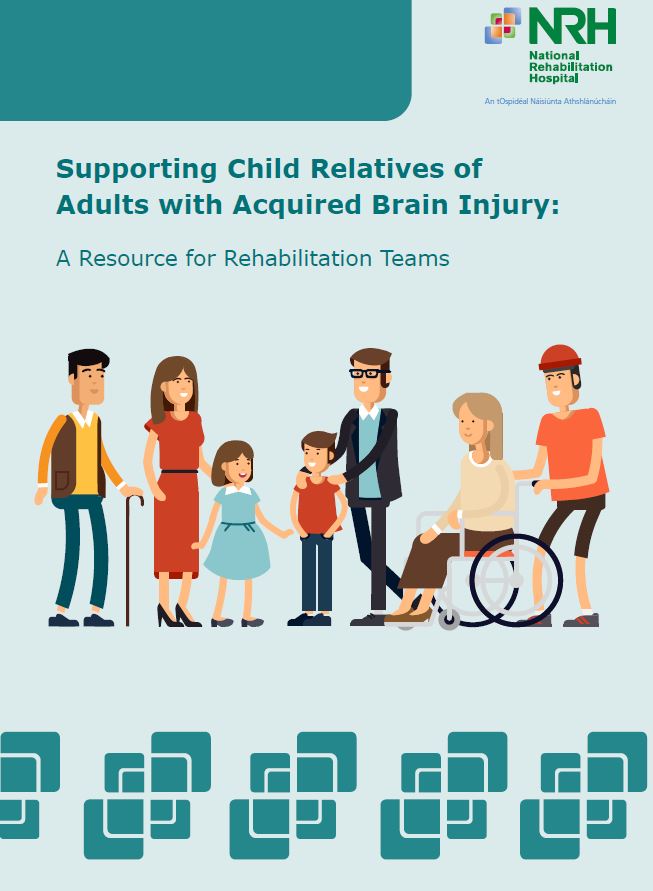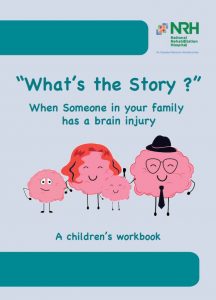Supporting Child Relatives of Adults with ABI – A Resource Pack
March 20, 2022
The objective of this pack is to support staff to be more inclusive of child relatives; and to help them see the importance of including child relatives when working with adults with an acquired brain injury. The aim is that, with the aid of this resource, the inclusion of children could be integrated into the rehabilitation programme…
Read more
In the NRH Brain Injury Rehabilitation Programme, the interdisciplinary team works with patients with acquired brain injury and helps them to achieve goals in order to improve their quality of life. While some consideration is given to child relatives, the process has been largely client and carer centred. Many injured persons have young children, and there has been an inconsistent approach across the service in terms of helping children cope with and adjust to their brain injured parent or relative. The NRH is not alone in this. A study undertaken to establish the extent of child relatives’ involvement in rehabilitation, across approximately 100 UK rehabilitation teams in 2005, concluded that only 19% of participants had reported working with child relatives, indicating that children are not routinely included in interventions.
There has been a new emphasis in recent years on the importance of family focused rehabilitation, with the UK’s ‘Think Family’ policy, as well as research from various authors, such as Audrey Daisley. To date in Ireland, rehabilitation has been more client and carer focussed. The NRH Social Work Department has therefore developed this resource pack, the aim of which is to strengthen the family approach to rehabilitation.
The objective of this pack is to support staff to be more inclusive of child relatives; and to help them see the importance of including child relatives when working with adults with an acquired brain injury. The aim is that, with the aid of this resource, the inclusion of children could be integrated into the rehabilitation programme.
This resource pack has been designed to provide staff with the tools and confidence to work with children. The pack has been developed to serve as a toolkit with suggestions and ideas on how to work with children, and to provide information on the developmental stages of children and how they are impacted by brain injury.
It should also be noted that including children in the rehabilitation process does not necessitate exclusively working directly with the children. Staff can support family members to consider and meet the needs of their children during the rehabilitation process. While the pack is mainly directed at rehabilitation staff, much of the information and tips will be useful for non-healthcare workers also.
Research has shown that children with brain injured parents can have significantly more emotional and behavioural problems than children in the general population. Involving child relatives in the rehabilitation process impacts on their adjustment and consequently has a positive impact on family relationships. Including child and family-centred goals in a rehabilitation programme also has benefits for patients as it can result in their programme being more meaningful and help to motivate them during their rehabilitation.
This pack is divided into three sections:
- Introduction – Involving Child Relatives in Rehabilitation;
- Interventions
- Resources
The pack is accompanied by a workbook for children – “What’s the Story?” When someone in your family has a brain injury. The workbook can be given to parents and teachers if deemed appropriate. The workbook contains some information that should be helpful in explaining brain injury to children, while also allowing them to communicate their own experiences.
While this pack was compiled by Phil Butler on behalf of the Social Work Department, it would not have been possible without the invaluable support of the Dr Tom Gregg Bursary Fund.
We would also like to pay particular tribute to Dr Audrey Daisley,Consultant Clinical Neuropsychologist in the Oxford Centre for Enablement, who has a particular interest in the issues facing children who have a relative with brain injury and in 1995 established the first NHS service to specifically support child relatives. Dr Daisley was the inspiration for the project and was extremely generous with her time, resources and publications. The sections entitled ‘practical tips’ and ‘common questions asked by children’ are directly based on her research.
Anne O’Loughlin, Prinicipal Social Worker, National Rehabilitation Hospital.
Show less



